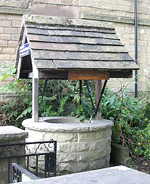How to have your own water supply
Mary Wilson looks at how to go about creating your own water supply for your property


Exquisite houses, the beauty of Nature, and how to get the most from your life, straight to your inbox.
You are now subscribed
Your newsletter sign-up was successful
The Environment Agency is calling for near universal water metering in England and Wales, which could mean that the South-East the most ‘water stressed’ area is totally metered by 2015. The average home uses a ton of water a week, so, for many, this could mean a dramatic surge in annual water charges. However, some lucky people will never have to worry about increasing bills, as their water comes from a well, a spring or a borehole.
Only 1% of properties in England and Wales have private water supplies, but owners of those that do are delighted to be free from paying water rates. ‘I’ve had my own water supply since I bought Knights Farm 13 years ago,’ says Myra Fonceca, who is now selling the farm in Musbury, Devon. ‘It’s much cheaper and it tastes really different even my dogs notice it. I also like not being dependent on the water companies.’
For more property features like this every week, subscribe and save
Mrs Fonceca’s water supply comes from a well, in which she has put a submersible pump. ‘It keeps the noise down. The well’s never dried out and the pump has only gone wrong once,’ she says. The only cost is annually servicing the UV filter, which gets rid of bacteria. ‘It’s an easy job, but because there are no longer any water-treatment companies nearby, it costs about £200 because of the travelling time.’ The farm also has a sewage treatment plant. ‘The only problem we’ve ever had with this was when a snail became stuck in the works.’ The Grade II-listed property, which has five bedrooms and 1.75 acres, is for sale through Chesterton Humberts (01404 42456) for £675,000.
‘Having a private water supply can occasionally be detrimental,’ says Ian Lange of Chesterton Humberts’ Honiton office. ‘There’s still an element of prejudice by some purchasers, who don’t understand what it means, whether it’s safe and what it entails. We recommend that a purchaser has their own test done on a private water supply for quality and quantity before they buy. We recently sold a house owned by a lady in her eighties, who was perfectly healthy, although it turned out that the water was contaminated. She was obviously used to it.’
If the water is very acidic, you need to have a pH balancer, which neutralises the acidity, or vice versa in other areas. ‘Otherwise, any copper pipes will deteriorate within 10 years, and, if you thought about dying your hair blonde, it might well turn green,’ says Mr Lange. You should also fit a particle filter, which gets rid of bits of broken bracken and dead frogs, and, in some areas, an iron-and-manganese filter, a cation-exchange filter to remove lead or a reverse-osmosis filter to remove aluminium or nitrate. It’s also important to find out about the recovery rate how quickly the supply is replenished.
For more property features like this every week, subscribe and save
Exquisite houses, the beauty of Nature, and how to get the most from your life, straight to your inbox.
A family will need a storage tank of about 500 gallons if the water does not come in quickly enough. ‘The slower the recovery rate, the larger the storage capacity will be needed, and that’s something to think about if you’re considering extending the house and putting in more bathrooms, for example,’ adds Mr Lange. If you have an untapped water supply that you want to use, you’ll need to have the water tested by your local council or a private laboratory, and you’ll also require permission from your local authority to install a sewage-drainage system.
The Drinking Water Inspectorate (www.dwi.gov.uk) has useful information for people with, or thinking about having, their own water supply, and local water-treatment companies can be sourced in the Yellow Pages or on the internet.
Country Life is unlike any other magazine: the only glossy weekly on the newsstand and the only magazine that has been guest-edited by His Majesty The King not once, but twice. It is a celebration of modern rural life and all its diverse joys and pleasures — that was first published in Queen Victoria's Diamond Jubilee year. Our eclectic mixture of witty and informative content — from the most up-to-date property news and commentary and a coveted glimpse inside some of the UK's best houses and gardens, to gardening, the arts and interior design, written by experts in their field — still cannot be found in print or online, anywhere else.

